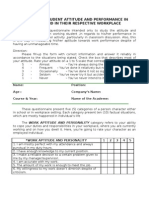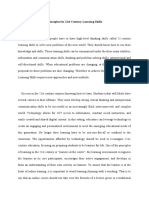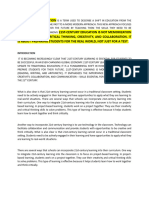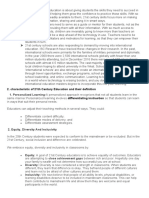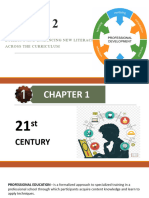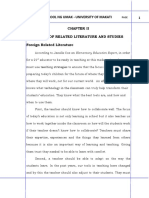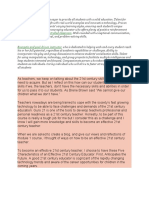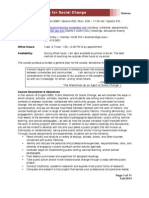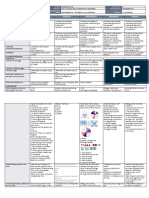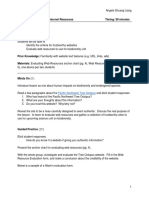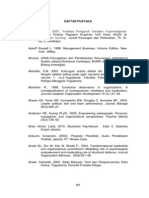Gec Reading Folio
Gec Reading Folio
Uploaded by
Normie AsminCopyright:
Available Formats
Gec Reading Folio
Gec Reading Folio
Uploaded by
Normie AsminOriginal Description:
Copyright
Available Formats
Share this document
Did you find this document useful?
Is this content inappropriate?
Copyright:
Available Formats
Gec Reading Folio
Gec Reading Folio
Uploaded by
Normie AsminCopyright:
Available Formats
What is 21st Century Education and Why Is It Important?
HOME \ SEÑOR ESCABAR \
As our world recognizes increased globalization, 21st century learning refers to the skills
and technologies that will position our students to succeed in a world that ever increasingly
requires collaboration, critical thinking, adaptability, grit, perseverance and relies less on
the learning of facts and data. The how and why of learning becomes central and is far
more important than the what or who from past models. Students must approach lifelong
learning with a flexible mindset as they tackle 21 st century issues. They must learn to work
with and listen to a variety of points of view.
As a world we are seeing that there is more and more need for global cooperation and by
the time our current students enter the work force that will increase exponentially. As such,
current classrooms need to be transformed into global classrooms where a variety of
cultures are explored and discourse around justice and tolerance become essential
components. Teachers need to demonstrate their willingness to change, be flexible and
avoid rigidity; to be willing to try new things and fail. From failure comes grit and the ability
to move on from something that doesn’t work to something that does work. Students must
be encouraged to try, to be allowed to fail and from that failure learn and move on. Parents
need to support this at home.
As we inspire students to be lifelong learners, we must focus on collaboration, systems
thinking, developing empathy, ease in communication and the use of technologies that
serve to help us tackle real world issues.
Project based learning and group work is the standard in education today. Listening to
different points of view, working with a variety of people with each contributing to the whole
is a hallmark of 21st century learning. Creating systems to tackle real world problems;
brainstorming ways to solve a problem and trying a variety of potential systems until one
works is how great discoveries are made.
Understanding that there are people with many different talents, strengths and opinions;
assuming good will when embarking on a task and listening intentionally to others points of
view are ways to help foster empathy. Approaching a task from the notion that you have
much to offer and much to learn is also a fundamental tenant of empathy. Our students
must be comfortable with public speaking, expressing their ideas verbally as well as in
written format.
Technology plays a big part in 21st century learning. The use of podcasts, audio and video
blogs and online learning all play into how education is moving and is significant in high
schools and universities. Our focus at MPS is in developing basic computer skills including
the ability to navigate the Internet for research. The Internet is the connection to our global
world. Students will acquire Internet navigation skills as they move through our program.
The vast array of resources on the Internet provides a wealth of data and students will
learn to filter the essential from the nonessential; to incorporate visual images and
graphics. The use of the interactive White Board is a valuable classroom tool. Students will
have facility with iPads and laptop computers.
21st century learning will help our students thrive and survive at MPS, high school,
university and the work place.
Jeff Escabar
FEBRUARY 25, 2015 | SEÑOR ESCABAR |
You might also like
- 7 Habits WorkbookDocument33 pages7 Habits WorkbookKỵ Sĩ Bóng Đêm71% (7)
- A Working Student Attitude and Performance in School and inDocument4 pagesA Working Student Attitude and Performance in School and inSam Cy Puyales83% (12)
- 5 Essential 21st Century Teaching StrategiesDocument7 pages5 Essential 21st Century Teaching StrategiesJane Quintos100% (1)
- Fourc's 21st CenturyDocument5 pagesFourc's 21st CenturyZeus OngNo ratings yet
- Playbuilding Assessment Term 1Document2 pagesPlaybuilding Assessment Term 1api-278066547No ratings yet
- Lesson Plan 1 G8 Wiring DiagramDocument3 pagesLesson Plan 1 G8 Wiring DiagramNiel Ivan Alliosada Quimbo100% (1)
- Assessment Manual 2014Document27 pagesAssessment Manual 2014Shahebaz WandrickNo ratings yet
- TVE105 Activities Modules 1-4Document12 pagesTVE105 Activities Modules 1-4Nesh Rain IINo ratings yet
- Aies02 Clase 1Document14 pagesAies02 Clase 1Victoria alboneozNo ratings yet
- EDUC-3202 NotesDocument22 pagesEDUC-3202 NotesNoo BoddieNo ratings yet
- Seameo Innotech Study NotesDocument25 pagesSeameo Innotech Study NotesPrincess Joy GavileñoNo ratings yet
- Principles For 21st Century Learning SkillsDocument4 pagesPrinciples For 21st Century Learning SkillsRickver DiezNo ratings yet
- 21STDocument4 pages21STNatalie AstilloNo ratings yet
- EDUC 105 ReviewerDocument31 pagesEDUC 105 ReviewerBRENT ALCANTARANo ratings yet
- AIES Modulo2Document49 pagesAIES Modulo2Rocío OlateNo ratings yet
- 21st Century Education ModelDocument16 pages21st Century Education ModelKhimz YadacNo ratings yet
- Learning Material 1-21st Century EducationDocument9 pagesLearning Material 1-21st Century EducationAce EchavezNo ratings yet
- Module 1. 21st Century EducationDocument7 pagesModule 1. 21st Century EducationAngelo OmipingNo ratings yet
- 21st Century Approaches and Strategies in Social Studies FSSDocument6 pages21st Century Approaches and Strategies in Social Studies FSSJohn MirandaNo ratings yet
- 21th CenturyDocument5 pages21th CenturyAbba May DennisNo ratings yet
- Benlac-Reviewer-Prelim-Module 1 and 2Document8 pagesBenlac-Reviewer-Prelim-Module 1 and 2Mary Angeline De LeonNo ratings yet
- 21st Century EducationDocument8 pages21st Century EducationKhimz YadacNo ratings yet
- Presentasi FiksDocument20 pagesPresentasi FiksAngga Dewa SaputraNo ratings yet
- Sample AnswersDocument9 pagesSample AnswersJane Uranza CadagueNo ratings yet
- 21st CenturyDocument23 pages21st CenturyTimmy ValdezNo ratings yet
- 21st Century EducationDocument17 pages21st Century EducationJahseh OnfroyNo ratings yet
- LC-1 Ped10Document8 pagesLC-1 Ped10Renave MaeNo ratings yet
- Critical Attributes of The 21st CenturyDocument4 pagesCritical Attributes of The 21st CenturyJeana UanangNo ratings yet
- Technology and Language EducationDocument3 pagesTechnology and Language EducationJosephine May PitosNo ratings yet
- Edutopia Parents Guide 21st Century LearningDocument10 pagesEdutopia Parents Guide 21st Century LearningAma FrempsNo ratings yet
- Educ 110 Module PrelimDocument30 pagesEduc 110 Module PrelimLaurel Ana LoraineNo ratings yet
- EDUC 110 MODULE PreDocument78 pagesEDUC 110 MODULE PreLaurel Ana LoraineNo ratings yet
- Online Assignment-Education in The 21st CenturyDocument2 pagesOnline Assignment-Education in The 21st CenturySumithra KrishnanNo ratings yet
- 21st Century Education Introduction StduentsDocument13 pages21st Century Education Introduction Stduentsmellanieduque6No ratings yet
- L2 BenlacDocument42 pagesL2 BenlacCABRERA ABIGAIL P.No ratings yet
- THE 21 Century Teachers: Prepared By: Richie Kathleen A. TarregaDocument28 pagesTHE 21 Century Teachers: Prepared By: Richie Kathleen A. TarregaDanibel MelchorNo ratings yet
- Building and Enhancing New Literacies Across The Curriculum 1 For MergeDocument134 pagesBuilding and Enhancing New Literacies Across The Curriculum 1 For Mergenicacadavero06No ratings yet
- Ped 110X Jemilyn Ascura 1Document31 pagesPed 110X Jemilyn Ascura 1Nistan jen SolanoNo ratings yet
- Define 21st Century EducationDocument6 pagesDefine 21st Century EducationJaneth Serna Rodriguez100% (2)
- 21st Century Teachers and LearnersDocument2 pages21st Century Teachers and LearnersPrincess GonzalesNo ratings yet
- 7 Global Trends in Education in The 21stDocument4 pages7 Global Trends in Education in The 21stJennifer R. JuatcoNo ratings yet
- MC 12 Chapter 1 - Chapter 3Document24 pagesMC 12 Chapter 1 - Chapter 3scarletjane888No ratings yet
- Lesson 3 The Changing Global Landscape For The 21 Century TeachersDocument15 pagesLesson 3 The Changing Global Landscape For The 21 Century TeachersalgieNo ratings yet
- Group of Bernardino Chapter 2 FINALDocument22 pagesGroup of Bernardino Chapter 2 FINALfrancis JoeyNo ratings yet
- 21st Century LearningDocument6 pages21st Century LearningLeanne Marie EyasNo ratings yet
- Critical Attributes of The 21st Century Education Report (Soft Copy)Document7 pagesCritical Attributes of The 21st Century Education Report (Soft Copy)markikiallietoNo ratings yet
- Empowering TheDocument1 pageEmpowering TheRobert Ryan ArinsolNo ratings yet
- Greg Roebuck Sabbatical ReportDocument7 pagesGreg Roebuck Sabbatical ReportSaran SaraNo ratings yet
- EDU5 Module 4Document7 pagesEDU5 Module 4Aryel LeoninNo ratings yet
- Module 1 21st Century EducationDocument12 pagesModule 1 21st Century EducationMaan ArceniaNo ratings yet
- 21ST Century EducationDocument7 pages21ST Century EducationmalayrolamesheijoyNo ratings yet
- 21 Stcentury EducationDocument14 pages21 Stcentury EducationNazar Danedogawa100% (1)
- 21st Century EducationDocument6 pages21st Century Educationrdddn54s4jNo ratings yet
- Education in The 21ST CenturyDocument8 pagesEducation in The 21ST CenturyMaricel BaltazarNo ratings yet
- Jorenal C. Benzon Bsed-Filipino Ii PED 13Document3 pagesJorenal C. Benzon Bsed-Filipino Ii PED 13Jorenal BenzonNo ratings yet
- ScienceDocument3 pagesScienceRegine BarramedaNo ratings yet
- 21st Century PedagogyDocument7 pages21st Century PedagogyAbah AimanNo ratings yet
- Eaching Professional Who Is Eager To Provide All Students With A Solid EducationDocument26 pagesEaching Professional Who Is Eager To Provide All Students With A Solid EducationSyzian ExonyryNo ratings yet
- 1 Prelim ModuleDocument38 pages1 Prelim ModuleAutumn CicadaNo ratings yet
- 2profed10-Comparative EssayDocument3 pages2profed10-Comparative EssayArjoy Grace PedrajasNo ratings yet
- The 21st Century TeacherDocument23 pagesThe 21st Century TeacherPax GarciaNo ratings yet
- Digital Education PlatformDocument3 pagesDigital Education PlatformDsquare solutionsNo ratings yet
- Educational System in a Globalized World: Best Practices in Teaching OnlineFrom EverandEducational System in a Globalized World: Best Practices in Teaching OnlineRating: 5 out of 5 stars5/5 (1)
- Teaching for Understanding with TechnologyFrom EverandTeaching for Understanding with TechnologyRating: 4 out of 5 stars4/5 (1)
- Pedagogical Analysis of The Subject of Commerce On The Topic ofDocument18 pagesPedagogical Analysis of The Subject of Commerce On The Topic ofsurajrtkNo ratings yet
- Public Rhetorics For Social Change Syllabus Holmes Fall 2013Document11 pagesPublic Rhetorics For Social Change Syllabus Holmes Fall 2013Ashley HolmesNo ratings yet
- Building An Organization Capable of Good Strategic ExecutionDocument10 pagesBuilding An Organization Capable of Good Strategic ExecutionMustafa HussainNo ratings yet
- 2 1-2 2 Lesson PlanDocument3 pages2 1-2 2 Lesson Planapi-327986400No ratings yet
- Subiecte Oral Bilingv 2012Document30 pagesSubiecte Oral Bilingv 2012Andreea Neamțu100% (1)
- Peer Observation 1 - Questioning TechniquesDocument4 pagesPeer Observation 1 - Questioning TechniquesMarina ScifoNo ratings yet
- Naeyc Statement of CommitmentDocument3 pagesNaeyc Statement of Commitmentapi-250547670100% (2)
- Cognitivist and RasionalistDocument2 pagesCognitivist and RasionalistHendra De MunezNo ratings yet
- Goals and Techniques of Reading Skills Thesis PreparationDocument45 pagesGoals and Techniques of Reading Skills Thesis PreparationRangothri Sreenivasa SubramanyamNo ratings yet
- DLL Mathematics 5 q2 w8Document8 pagesDLL Mathematics 5 q2 w8Quennee Ronquillo EscobilloNo ratings yet
- Lesson Plan: Evaluating Web ResourcesDocument5 pagesLesson Plan: Evaluating Web ResourcesAngela LiangNo ratings yet
- Numeracy Professional Skills Test Practice Test 2: First Name SurnameDocument29 pagesNumeracy Professional Skills Test Practice Test 2: First Name SurnameblueNo ratings yet
- PrepTest2010 Introduction (ABRSM)Document4 pagesPrepTest2010 Introduction (ABRSM)Theresia Listya Marmita25% (4)
- COM 502 Assignment 1 - Report WritingDocument2 pagesCOM 502 Assignment 1 - Report WritingLendry NormanNo ratings yet
- Daftar Pustaka: Praktek. Jakarta: PT. Rineka CiptaDocument13 pagesDaftar Pustaka: Praktek. Jakarta: PT. Rineka CiptaHeri WaluyoNo ratings yet
- Book Category WiseDocument64 pagesBook Category WiseImran Khan SharNo ratings yet
- Chapter 3Document19 pagesChapter 3mia rolane jagoniaNo ratings yet
- Course ReflecDocument8 pagesCourse Reflecapi-301376054100% (1)
- Science - June 24th 2011Document129 pagesScience - June 24th 2011pys009No ratings yet
- Teaching English Vocabulary Using GamesDocument13 pagesTeaching English Vocabulary Using GamesMOHAMMAD AGUS SALIM EL BAHRI96% (72)
- Summary of Journal Aviation PsychologyDocument4 pagesSummary of Journal Aviation PsychologyNorsyakinah RasimanNo ratings yet
- Hydraulics Lab RubricsDocument7 pagesHydraulics Lab Rubricsvenkatraman200% (1)
- How Do I Apply For A Postdoc Position PDFDocument3 pagesHow Do I Apply For A Postdoc Position PDFDiana RoseNo ratings yet
- Empowerment Technologies - The Features of Web 2Document3 pagesEmpowerment Technologies - The Features of Web 2George Silandote89% (9)
- PG - Courses - 2018-19 - Brochure Final - 02072018 PDFDocument32 pagesPG - Courses - 2018-19 - Brochure Final - 02072018 PDFdr.menganeNo ratings yet

